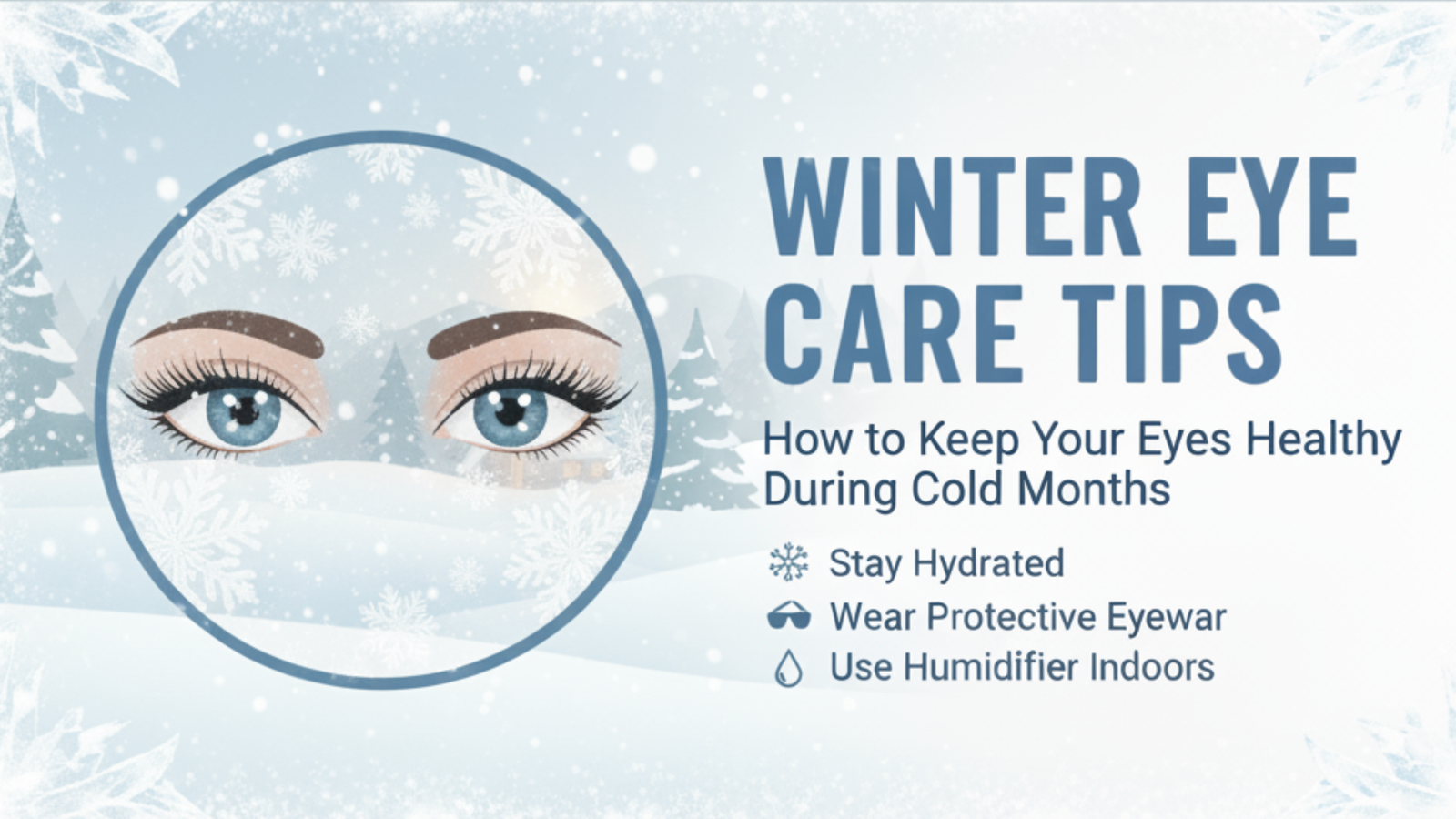As winter settles in with its crisp air and shorter days, many people turn their attention to staying warm and boosting their immunity. Scarves are wrapped tightly, moisturizers are brought back into daily routines, and comfort foods make their way onto the table. Yet, amid all these seasonal shifts, one essential aspect of well-being is often overlooked eye care tips.
While most associate eye issues with summer dust or spring allergies, the winter months can be just as harsh on your eyes. Cold winds, dry indoor heating, reduced humidity, and even increased screen time during cozy indoor days can contribute to a wide range of discomforts. This makes winter eye care not just important but essential.
Why Do Eyes Struggle More in Winter?
Winter air tends to be significantly drier than in other seasons. Outdoors, the cold air holds less moisture. Indoors, heaters further strip humidity from the environment. As a result, our eyes, the most exposed and sensitive organs, lose moisture more quickly. This can lead to dry eyes, redness, itchiness, and even increased tearing as the eyes overcompensate for the lack of lubrication.
Additionally, people tend to spend more time indoors during colder months, often in front of screens. Whether it’s working from home, binge-watching shows, or scrolling on phones, this increased screen time can aggravate eye strain, especially when blinking becomes infrequent, further drying the eyes.
For individuals already dealing with conditions like glaucoma, conjunctivitis, or chronic dry eyes, winter can intensify symptoms, making professional eye care even more important.
Practical Ways to Protect Your Eyes in Cold Weather
While winter may pose challenges, a few lifestyle adjustments can help maintain optimal eye health throughout the season. One of the most effective ways to start is by staying hydrated. It’s easy to forget to drink water when the temperature drops, but proper hydration is essential for tear production and maintaining the eye’s natural moisture barrier.
Another critical factor is eye protection. Although many associate sunglasses with summer, UV rays remain harmful year-round. In fact, they can be even more intense during winter, especially when reflected off surfaces like snow or water. Wearing UV-protective sunglasses during the day can protect the cornea and reduce the risk of long-term damage.
Indoor environments also play a role. Using a humidifier can help restore moisture to dry air and relieve symptoms associated with dry eyes. If that’s not possible, placing a bowl of water near heaters or radiators can serve as a simple alternative. Reducing direct exposure to heating vents or fans blowing into the face can also help prevent tear film evaporation.
And of course, sleep remains a pillar of healthy vision. During sleep, the eyes rest, rehydrate, and repair. Maintaining a consistent sleep schedule, ideally 7–8 hours a night can significantly improve symptoms related to fatigue or dryness.
Winter Eye Infections and How to Avoid Them
Colds, flu, and other infections tend to rise during the winter months, and your eyes are not immune. Viral conjunctivitis, for example, can spread more easily in crowded indoor spaces and through contaminated hands or surfaces. Simple habits like avoiding touching the eyes, washing hands frequently, and not sharing towels or cosmetics can go a long way in reducing infection risk.
Contact lens users need to be especially cautious during winter. Dry air can cause lenses to become uncomfortable or lead to irritation. Ensuring lenses are cleaned properly, avoiding overuse, and opting for moisture-rich eye drops (approved by an eye specialist) can help maintain comfort and eye safety.
Children and Elderly Require Extra Care
Young children and the elderly are particularly vulnerable to seasonal eye issues. For children, exposure to dust, increased screen time during school holidays, and lack of awareness about hygiene can result in frequent infections or discomfort. Meanwhile, seniors may already be managing age-related eye conditions like cataracts or macular degeneration, and the dry air of winter can worsen symptoms.
Regular checkups during the colder months are highly recommended for these age groups. A visit to a trusted Hyderabad eye hospital can help identify early signs of seasonal or chronic conditions and provide timely care.
Diet, Immunity, and Vision in Winter
Nutrition plays a bigger role in eye care than most realise. During winter, the body’s immune defences can slow down, making it even more important to consume nutrient-rich foods that support eye health. Leafy greens, carrots, bell peppers, and citrus fruits provide essential vitamins like A and C, while omega-3 fatty acids found in fish such as salmon help improve tear quality and reduce inflammation.
Taking care of the eyes from within is as important as any external precaution.
When to See a Doctor
While mild discomfort from dryness or light sensitivity may not be alarming, persistent or worsening symptoms should never be ignored. If you experience blurry vision, eye pain, excessive tearing, or signs of infection like redness and discharge, it’s best to consult a qualified ophthalmologist.
Prompt care can prevent minor issues from escalating into long-term problems. Moreover, winter is a good time to schedule routine eye exams, especially for individuals with existing conditions or those over the age of 40.
Your Trusted Eye Care Partner in Hyderabad
At Eyecure Hospital, we understand how seasonal changes can impact your vision. Located in Trimulgherry, Secunderabad, our team of experienced ophthalmologists provides specialized care tailored to meet the unique needs of every patient.
Whether you’re experiencing dry eyes, irritation, or vision changes during winter or simply want to ensure your eyes are healthy, our comprehensive diagnostic tools and personalized treatment plans are designed to offer clarity and comfort.
As a leading Hyderabad eye hospital, Eyecure Hospital is equipped to handle everything from basic eye exams to advanced surgeries with precision and compassion. Our goal is not only to treat symptoms but to help patients maintain long-term visual health through education, prevention, and expert care.
Winter may bring its fair share of eye-related challenges, but with the right habits and professional guidance, you can enjoy the season without compromising your vision. Pay attention to hydration, protect your eyes from harsh environments, eat well, and don’t hesitate to seek help when something feels off.
Your eyes are precious, and this winter, they deserve the same protection as the rest of your body.


